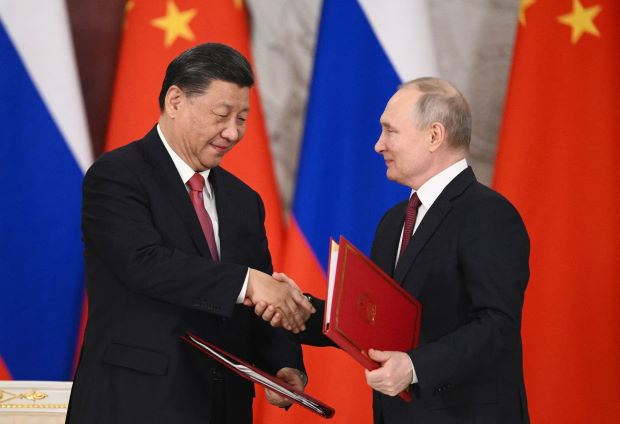Putin, Xi discuss Chinese peace proposal for Ukraine
MOSCOW – Russian President Vladimir Putin and Chinese leader Xi Jinping discussed Beijing’s proposal for a ceasefire in Ukraine in talks in Moscow, while displaying a warm friendship forged on a mutual rivalry with the West.
Xi’s visit is a boost to Moscow as it struggles to make ground in its year-long war on Ukraine. It was criticized by Washington as providing “diplomatic cover” for Putin and for the war that has killed tens of thousands of people.
While China has sought to cast itself as a potential peace-maker in the conflict, the visit underlined an ever-closer relationship between Moscow and Beijing.
The two men spoke for more than four hours on Monday (20) and enjoyed a state dinner at the Kremlin, warmly praising each other as a “dear friend”, Russian media reported.
By contrast, Xi may only speak to Ukrainian President Volodymyr Zelenskiyy by telephone, if at all.
In a surprise visit pointedly coinciding with Xi’s Moscow talks, Japanese Prime Minister Fumio Kishida arrived in Kyiv on Tuesday (21) to deliver a message of solidarity and support for Ukraine.
In other developments, Ukraine said an explosion in Dzhankoi in the Russian-occupied Crimean peninsula destroyed Russian cruise missiles intended for use by Russia’s Black Sea fleet.
On the battlefields in eastern Ukraine, Russia kept up air raids as well as missile and rocket strikes over a wide area, the Ukrainian military said.
Ukraine said Russia’s main aim was to reach the borders of Donetsk and Luhansk regions in the Donbas, large areas of which are already under Russian control.
Russian forces had again made attacks on the city of Bakhmut – site of the longest and bloodiest battle of the war – and other targets but had been repelled, it said.
Kremlin spokesman Dmitry Peskov said Putin and Xi had on Monday talked about a Chinese proposal calling for a de-escalation and eventual ceasefire in Ukraine.
“There was a very thorough exchange of views, a serious conversation,” he said.
He declined to give further details but said there would be a joint statement after the two leaders meet for a second day of talks.
The Chinese document sets out some general principles in a 12-point plan but contains no details on how to end the war, now in its 13th month.
The proposal has been largely dismissed in the West as a ploy to buy Putin time to regroup his forces and solidify his grip on occupied land.
Ukrainian and Western officials fear any ceasefire would merely freeze the front lines, handing Russia an advantage following a series of setbacks since it launched its invasion in February last year.
US Secretary of State Antony Blinken said Xi’s visit suggested that “China feels no responsibility to hold the Kremlin accountable for the atrocities committed in Ukraine”.
“Instead of even condemning them, it would rather provide diplomatic cover for Russia to continue to commit those grave crimes,” Blinken said.
Xi also invited Putin to visit China and called for regular meetings between their prime ministers, China’s state news agency Xinhua reported.
China has refrained from condemning Russia or referring to Moscow’s intervention in its neighbour as an “invasion”. It has also criticized Western sanctions on Russia.
Foreign policy analysts said while Putin would be looking for strong support from Xi over Ukraine, they doubted his Moscow visit would result in any military backing.
Washington has said in recent weeks it fears China might arm Russia, a plan Beijing has denied.
Kyiv, which says the war cannot end until Russia pulls out its troops, has been circumspect towards China, cautiously welcoming Beijing’s peace proposal when it was announced last month.
It was not clear if and when exactly Xi would talk to Ukraine’s Zelenskiyy
“We are waiting for confirmation,” Ukraine’s Deputy Prime Minister Iryna Vereshchuk told Italian newspaper Corriere della Sera. “That would be an important move. They have things to say to each other.”
But the visit by Japan’s Kishida to Kyiv at the same time that Xi was in Moscow was a signal of resolve by the West and its allies in backing Ukraine.
Kishida arrived in Kyiv by train from Poland and would convey “his respect for the courage and perseverance of the Ukrainian people standing up to defend their homeland,” the Japanese foreign ministry said.
In the town of Chasiv Yar, just west of Bakhmut, and the nearby village of Kalynivka in eastern Ukraine, heavy artillery fire burst from nearby Ukrainian positions as well as incoming impacts.
Between apartment blocks in Chasiv Yar, mainly elderly residents queued for water and food delivered by a team from the State Emergency Service.
Oleksii Stepanov, speaking in the town of Kostyantinivka, said he had been in Bakhmut until five days ago but was evacuated when his house was destroyed by a missile.
“We were in the kitchen and the missile came through the roof. The kitchen was all that was left standing,” said the 54-year-old. He said there was constant mortar fire in the city when he left.
Ukraine’s Defence Ministry said an explosion in Dzhankoi city in Crimea destroyed Russian Kalibr-KN cruise missiles as they were being transported by rail.
A ministry statement said the missiles, designed to be launched from surface ships in Russia’s Black Sea fleet, had a range of more than 2,500 km (1,550 miles) on land and 375 km at sea. It stopped short of claiming responsibility for the attack.
Russian-installed officials in Crimea, which was annexed by Moscow in 2014, said the blast was caused by drones laced with shrapnel and explosives and targeted civilian sites. One person was injured.
Reuters was unable to independently verify either the Ukrainian or the Russian reports. A Russian military air base is located near Dzhankoi.
-Reuters



Comments are closed, but trackbacks and pingbacks are open.